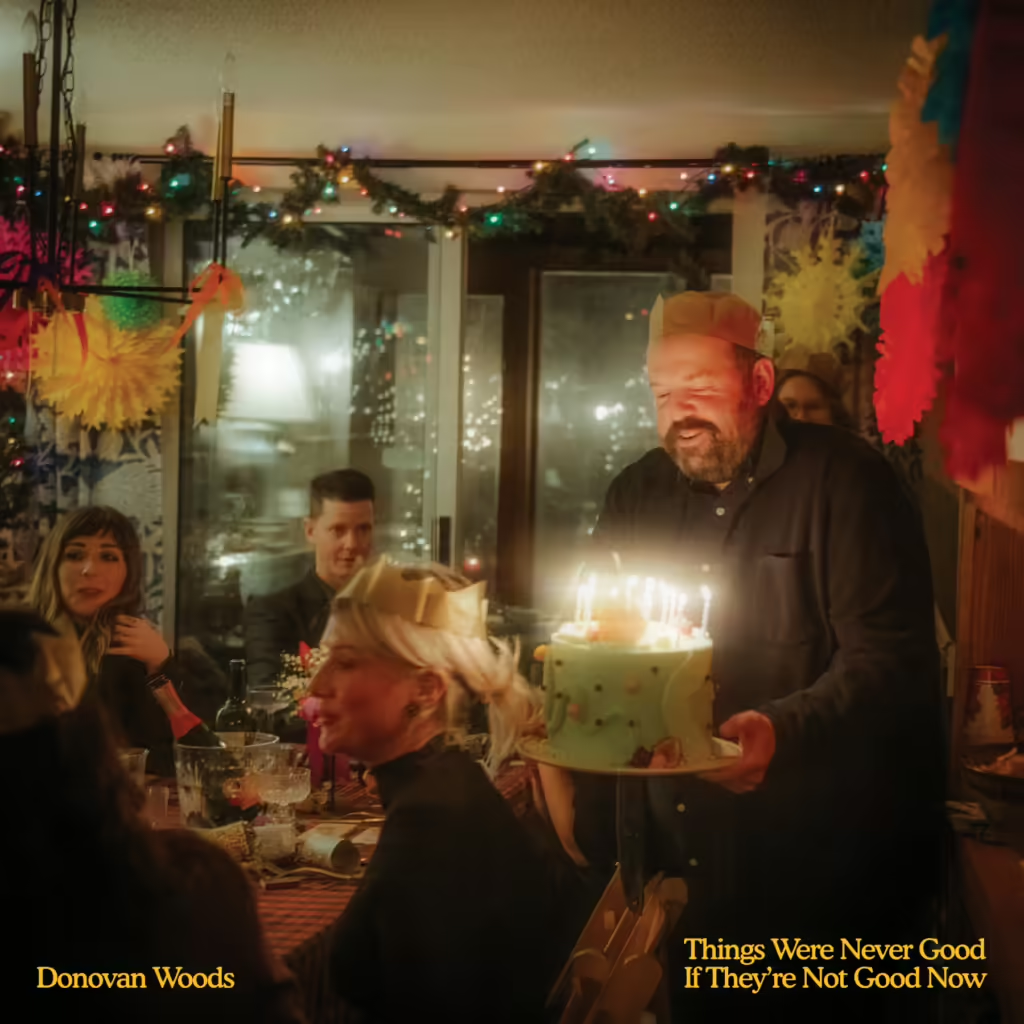Photo Credit: Brittany Farhat
Words by: Simon Coates
Emotions populate Donovan Woods’ lexicon, collected like charms on a bracelet— some care-worn and nibbled, others new and bright. On his eighth album, Things Were Never Good If They’re Not Good Now, which was released on July 12, Woods unveils his latest additions. But first, we need to talk about Australia. Fresh from his inaugural tour there, how was the experience?
“Australia was a trip,” he reflects. “I had a few humbling experiences. In Adelaide I played to fewer people than I have in, I’d say, a decade. But we had great crowds in the big cities. When you’re that far away from home, and people know the lyrics, it’s fulfilling. I didn’t pet a koala, do a shoey or see any deadly spiders though, so I will have to go back.”
Shoeys (the Australian ritual of drinking from a shoe) aside, Woods naturally felt humbled. Hewn from the same kind of rock as artists like Sam Beam (of Iron & Wine), fellow Canadian Dallas Green, or Conor Oberst, Woods trades in heartfelt candor. His songs offer a glimpse into life’s darkest corners, his honesty unflinching about its messy realities and personal impacts. And yet, despite this rawness, Woods doesn’t take himself too seriously. Dubbing himself “Big Donny Woo” on social media, he generously supports singers he admires.

Woods embodies the everyman, the ideal best friend— one you can confide your most personal secrets in and know he will understand because he’s been there himself. Speaking to CONE, he explains where the album’s title comes from. “It’s from a therapy technique that I’ve been trying to practice,” he begins “I have a hard time saying my needs and my feelings out loud, so I try to practice by announcing when I’m having a nice time. I say, ‘this is fun!’ Or, ‘I feel relaxed’. One time I said, ‘buddy, things were never good if they’re not good now.’”
One might wonder what thoughts were going through his head during the album’s creation. What lines of inspiration did he pursue? Are there any tracks on the album he’s especially proud of? His responses to all of these inquiries beautifully mirror the honesty and rawness of his music.
“When I started writing it, I was hoping it would be a laid-back affair,” he explains of his creative process. “But real life interjected and it became basically a mid-life crisis record. I always try to be honest in my writing but this time, thanks to a lot of therapy, I think I got to push off from the actual bottom of myself. I feel much better these days, so it’s strange to be promoting an album written when I was as lost as I’ve ever been.”
On the tracks that resonate deeply with him, Woods asserts that “Back for the Funeral” captures the essence of “how it feels to be alive.” “Back for the Funeral” is an profoundly erudite piece of Americana that finds Woods meditating on the irony of reuniting with his old friends in their hometown, years apart, only to gather for the funeral of another friend who tragically took their own life with a month’s worth of pills. It’s the kind of song Johnny Cash referred to when describing how country music speaks to our fundamental emotions: love, breakup, hate, death, apple pie—the whole spectrum.
When asked whether the cover artwork for Things Were Never Good If They’re Not Good Now. reflects Donovan’s newfound optimism, he says, “Certainly it does. A lot of the work I’ve done on myself in the last year is to unite my front-facing personhood with my actual self. The cover makes sense to me, because no one looks nicer than when they’re walking out with a birthday cake. But, you know, I’m not always walking with a birthday cake.”
Produced by Woods and longtime collaborator James Bunton, the album features collaborations with notable figures such as country music luminary Lori McKenna, folk-rocker Matt Nathanson, Grammy winner Amy Wadge, Sophie Ellis-Bextor collaborator Matt Prime and multi-instrumentalist Connor Seidel, who contributed to the album’s lead single “Rosemary.” Additional guests include Manitoba’s William Prince on “I’m Just Trying To Get Home” and Nashville-based Madi Diaz on “When Our Friends Come Over.”
The album is cohesively woven together, marking a compelling progression from 2020’s Without People, Woods’ album born during the COVID-19 lockdown, which also spawned its own spin-off. For the Donovan Woods With People project, artists and creators were encouraged to create artwork based on their reactions to the album. The result was wonderful, a spontaneous, traveling art exhibition. Given the success of the previous exhibition, did he consider doing something similar for the new album? He answers thoughtfully.
“That was a great project. I loved watching all that artwork get made,” he reflects on the rollout of the 2020 project. “That felt like the right thing to do given the circumstances of that album’s release. This record feels a little too close to the bone for something like that. But if anyone paints any pictures inspired by this album, please feel free to send them along.”
Now, it’s back to life on the road for Donovan Woods. After supporting The Gaslight Anthem on their 2023 US tour, he has a packed schedule of dates set for the remainder of this year. Regarding performing in front of a crowd, he expresses, “I still love to play live. It completes the circle.” Woods adds, “A song isn’t really even done until you perform it, or at least you don’t understand it until you feel what it means out loud. A song’s meaning is often clarified in performance. I think my concertgoers are a niche, like-minded group of folks. It takes a particular type of song-lover to commit a Friday night to my type of songs, so I’m always just appreciative. I know how hard it is to build an audience. I hope I can keep people satisfied and curious.”

